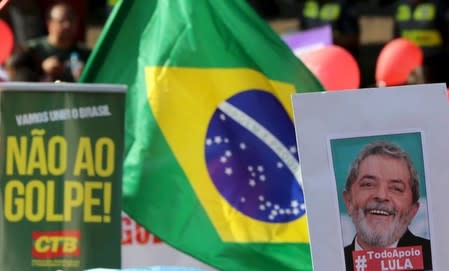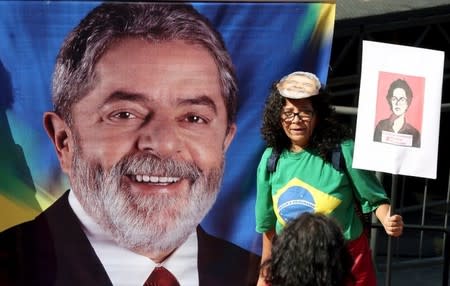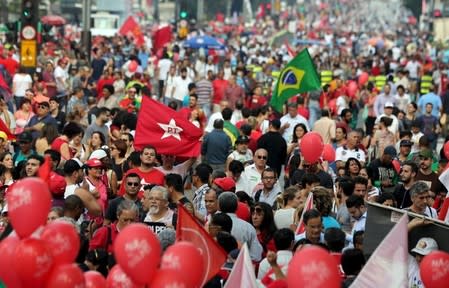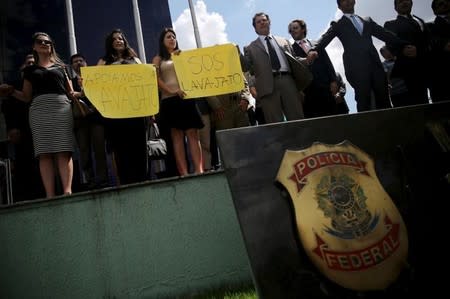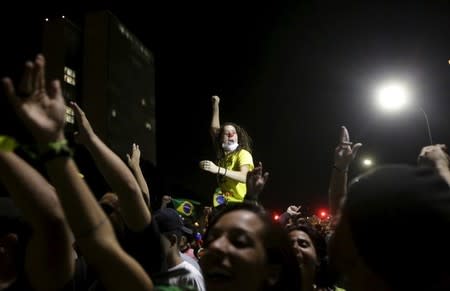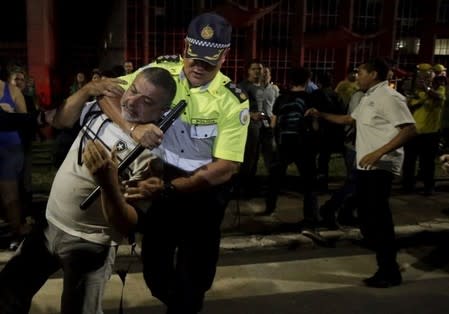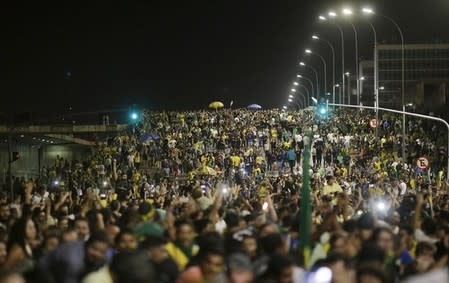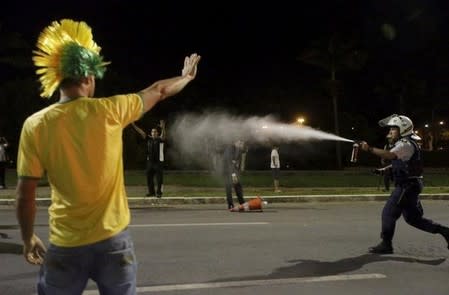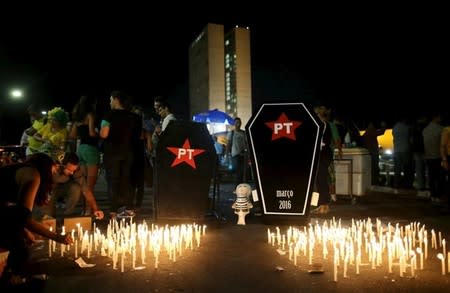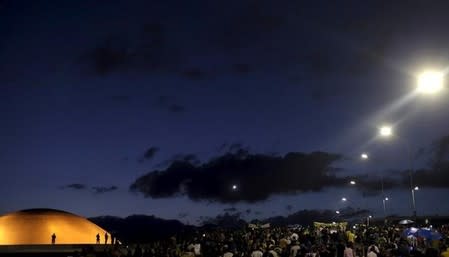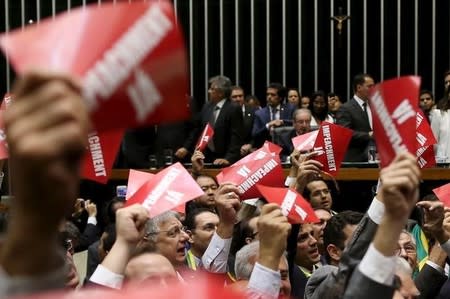Rousseff supporters rally to counter anti-government protests
By Daniel Flynn and Anthony Boadle SAO PAULO/BRASILIA (Reuters) - Supporters of Brazil's ruling Workers' Party joined street rallies on Friday to back the beleaguered government of President Dilma Rousseff, while her opponents in Congress started the clock on impeachment proceedings. Brazil's political crisis also reached the Supreme Court, which has received a dozen motions to suspend this week's appointment of former President Luiz Inacio Lula da Silva as Rousseff's chief of staff. The post, which has inflamed government opponents, gives a boost to Lula's political heir and also provides him with legal shield from graft investigators, as only the Supreme Court has jurisdiction over cases involving sitting cabinet ministers. Before Friday's pro-government protests, thousands of supporters gathered on Sao Paulo's Paulista Avenue, clad in the bright red Workers' Party shirts and surrounded by a heavy police presence. "We are all Dilma," read a sign carried by several women. Hours earlier, riot police fired water cannon and tear gas disperse anti-government protesters who had blocked the same central Sao Paulo thoroughfare since Wednesday evening, when demonstrations erupted against Lula's appointment as minister. Opponents say his nomination is designed to help Lula evade prosecutors who charged him with money laundering and fraud linked to the biggest corruption probe in Brazil's history, centered on state oil firm Petrobras. Lula's legal situation as minister was uncertain after Rousseff's opponents filed a flurry of requests for court injunctions to suspend his appointment on the grounds that it was unconstitutional and obstructed justice. Two injunctions were issued but overruled after the attorney general appealed, asking the Supreme Court to rule on the motions. In Brasilia, where thousands of demonstrators have demanded Rousseff's ouster over the last two days, police told protesters to stay away from the Congress building, where a pro-government demonstration was planned for 5 p.m (2000 GMT). In the lower house of Congress, opposition parties hurried along impeachment proceedings against Rousseff by holding a session on Friday, when lawmakers are usually away from Brasilia. The president has 10 sessions in the lower house to present her defence and the clock started on those 10 sessions on Friday, even though the special impeachment committee did not meet. The impeachment case is centred on allegations that Rousseff broke budget rules to boost spending as she campaigned for re-election in 2014. Lula and Rousseff both deny any wrongdoing. Antonio Imbassahy, the leader of the opposition Social Democratic Party of Brazil (PSDB) in the lower house, said the committee could present its findings by mid-April. Committee chairman Rogerio Rosso, of the Social Democratic Party (PSD) that is part of Rousseff's governing coalition, said the committee was balanced between lawmakers for and against unseating Rousseff, but recent political events would influence their decisions. "The large street demonstrations are echoing here. Political instability is growing," Rosso said on local television. Rousseff's main coalition party, the fractious Brazilian Democratic Movement Party (PMDB), has scheduled a March 29 meeting of its executive to decide whether to break with her government and seek her impeachment. The PMDB's leader, Vice President Michel Temer, would become Brazil's acting president if the lower house votes to impeach Rousseff and the Senate agrees to start a trial. "The PMDB's hurry is based on the will of the people. On Tuesday the 29th, the party will decide to break away," a party leader, Wellington Moreira Franco, said on Twitter. The party is considering expelling Mauro Lopes, a PMDB lawmaker who became Rousseff's civil aviation minister on Thursday despite a party ban on taking up new posts in her administration. PHONE CONVERSATIONS Rousseff appointed Lula, who remains one of Brazil's most influential politicians six years after leaving office, in an attempt to fight impeachment and win back working-class supporters amid the worst economic recession in decades. But his appointment has been overshadowed by taped telephone conversations between Rousseff and Lula that were released by a crusading anti-corruption judge who said they showed the pair discussing how to interfere with his Petrobras probe. The release of the recordings has inflamed tensions that were already running high between the judiciary and government. "This was illegal," Rousseff told a rally on Friday. "Only the Supreme Court has the authority to wiretap a president." In another recorded conversation made public on Friday, the president of the Workers' Party asked Rousseff's then-chief of staff Jaques Wagner to intervene after Sao Paulo prosecutors requested Lula's arrest. "Alert the president. There needs to be a State decision", said Rui Falcao. "You have to do something, because the state judge may decide today." Wagner answered: "Ok, let me do something here." (Additional reporting by Brad Haynes, Eduardo Simoes and Tatiana Bautzer in Sao Paulo, Maria Carolinea Marcello in Brasilia, and Pedro Fonseca in Rio de Janeiro; Editing by Frances Kerry)

